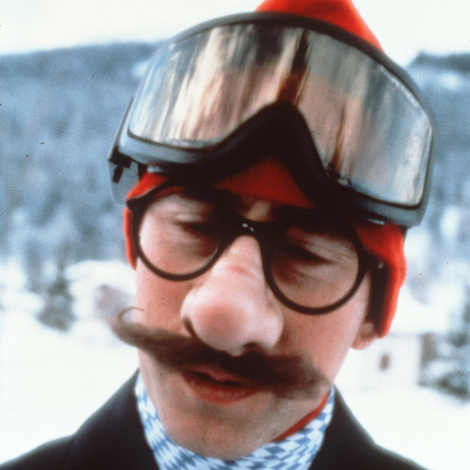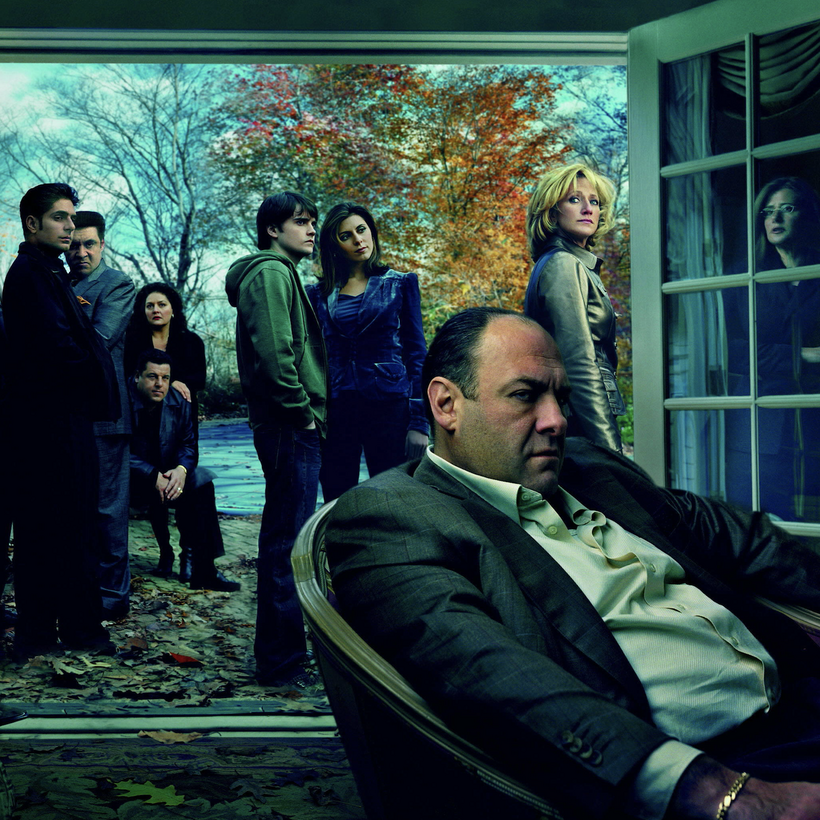Would Bada Bing! have stayed open during the pandemic? The New Jersey strip club was the Drones Club for wiseguys, where Tony Soprano and his crew aired their grievances and planned their heists, oblivious to the pole-dancing pulchritude around them.
Debuting on HBO on January 10, 1999, The Sopranos became America’s magnificent obsession, and the cast of hardworking New York actors—James Gandolfini, Edie Falco, Michael Imperioli, Nancy Marchand, and others—were catapulted to fame. During its six seasons, The Sopranos snared 112 Emmy nominations and 21 wins and was nominated for outstanding drama series, winning that accolade in 2004, a first for cable TV.

The show wasn’t just successful; it raised the stakes for episodic television in terms of story, characters, writing, acting, black humor—you name it. As Michael Imperioli (who so winningly played Tony’s nephew Christopher Moltisanti) noted, “What an unparalleled gathering of talent. And how it changed the world of television forever. There isn’t a dramatic series anywhere, on network or cable, that doesn’t owe something to The Sopranos.”
It’s hard to believe that The Sopranos has been off the air for 15 years—15 years!—but the pandemic’s long good-bye not only created a new generation of viewers binge-watching all 86 episodes, it also brought forth the podcast Talking Sopranos, in which Imperioli and Steve Schirripa (Bobby “Bacala” Baccalieri) rat out the secrets of David Chase’s masterpiece. “It became evident to us that The Sopranos had found an entire new flock of passionate followers,” Imperioli writes. “It was obvious that social media was the domain of the young—and these teens, twentysomethings, and thirtysomethings were now streaming The Sopranos on their iPhones and Androids.”

Now Imperioli and Schirripa have published Woke Up This Morning: The Definitive Oral History of “The Sopranos,” which grew out of their popular podcast and was helpfully laid out on the page by Philip Lerman. Both incarnations recall with great tenderness their friend James Gandolfini, a true saint of Newark beloved by his fellow cast members. Woke Up This Morning, not surprisingly, is dedicated “For Jim.”
Mobsters in Therapy
In the fall of 2011, Graydon Carter, then editor in chief of Vanity Fair (and currently the co-editor of AIR MAIL), assigned Jim Kelly and me the task of creating an oral history of the show. Problem was, most of the cast members had at that time taken the Fifth about The Sopranos. No one would make a move without the consent of the show’s creator, David Chase.
Eventually, Chase agreed to meet me for breakfast at the Four Seasons, in New York. He was accompanied by his publicist, Leslee Dart, who still wasn’t sure he would do it, so this was the audition. After breakfast, I asked Dart what more I could do to get Chase to agree. “You’re knocking on an open door. He’ll do it.”

So a few weeks later, I met with Chase and his wife, Denise, at the Waverly Inn. I learned that he and Denise had been high-school sweethearts, and that when not in New York, they lived in a château in the woods outside of Paris. Denise was charming and outgoing while David seemed, at first, a bit guarded. But he talked about how he’d dreamed up The Sopranos from an idea he had about “a mobster in therapy.” (The idea was already in the Zeitgeist—Analyze This! would premiere almost two months after The Sopranos debuted.)
More tellingly, he admitted that Tony’s diabolical mother, Livia Soprano, was based on his own mother, Maria. The mind reels to imagine, had she lived through the pandemic, Livia submitting to a vaccination or a mask—she would have been far too cynical for that. After all, when her grandson, Anthony, admitted he was seeing a psychiatrist, Livia snarled, “But that’s crazy. That’s nonsense. That’s nothing but a racket for the Jews!”

We talked about some of Chase’s favorite filmmakers—Kubrick, Scorsese, Polanski—and he admitted that he’d always wanted to direct and write movies, so perhaps it’s an irony that he found his biggest success on television. Chase’s first feature film, Not Fade Away, about a rock band in 1960s New Jersey, was followed this year by The Many Saints of Newark, his origin story of the Moltisantis, starring Alessandro Nivola as Richard “Dickie” Moltisanti (Tony’s mentor and Christopher’s father). Gandolfini’s son, Michael, played Tony Soprano as a teenager. With The Many Saints of Newark, you can see how the Moltisantis and the Sopranos took hold in Chase’s soul and have not yet let go—luckily for us.
I would soon hear from the writer Terence Winter, already at work on Boardwalk Empire at Steiner Studios, across from the Brooklyn Navy Yard. He mentioned how great he thought Chase was in casting and working with actors, though he was a strict constructionist when it came to dialogue. “When an actor came up to David and said, ‘My character wouldn’t say that,’ he’d go, ‘Who said it’s your character? It’s my character. You play the character that I created. No ad-libbing.’” Sometimes an actor would say, “You wrote ‘fucking cocksucker’ and I said ‘cocksucking fuck.’ What’s the difference?” And Chase would say, “It’s better the way it’s written.”
Conversation with Chase eventually turned to Peter Bogdanovich, who played Dr. Elliot Kupferberg, psychiatrist to Tony’s therapist, Dr. Jennifer Melfi (played by Lorraine Bracco). It was a fortuitous bit of casting all around, as Denise explained that Bogdanovich would buck up her husband when his energy flagged. She liked having Bogdanovich on the set for that reason. “Peter was like a Saint Christopher medal that made David feel he was safely headed in the right direction.”

I later interviewed Bogdanovich at a vegan restaurant in Los Angeles. I learned that he’d met David Chase when Chase was a writer for Northern Exposure, and he’d wanted to do an episode about Orson Welles, one of Bogdanovich’s beloved mentors and the subject of This Is Orson Welles, his 1993 book of conversations with the great man. Bogdanovich played himself in the Orson Welles episode, called “Rosebud,” which led to his being cast in The Sopranos.
“When an actor came up to David [Chase] and said, ‘My character wouldn’t say that,’ he’d go, ‘Who said it’s your character? It’s my character.’”
Just as Welles began as an actor long before he directed Citizen Kane, so it is with Bogdanovich, who began as an actor, studying with the legendary teacher Stella Adler, before becoming a director of the first rank (The Last Picture Show, Paper Moon, What’s Up, Doc?). Casting him as Dr. Melfi’s therapist was an inspired choice. But Bogdanovich also directed the sixth episode of Season Five of The Sopranos, “Sentimental Education,” written by Matthew Weiner, who went on to his own landmark success with Mad Men.
When I arrived at Caffe Dante in the West Village on a wintry day, Michael Imperioli was seated in front of the mural-size reproduction of Henry Holiday’s painting of Dante seeing his muse, Beatrice, on the Santa Trinita Bridge. It was faded after years of steam from the espresso machines. Imperioli is the opposite of Christopher Moltisanti, the hotheaded, ambitious character he played on The Sopranos. In real life, he’s a serious Buddhist practitioner who seemed more comfortable contemplating the nature of unborn insight than planning a heist.

I discovered that we had one thing in common: we both recalled seeing the real-life gangster Vincent “the Chin” Gigante shuffling up and down MacDougal Street in a blue bathrobe, pretending to be crazy when he was only deadly.
“Peter [Bogdanovich] was like a Saint Christopher medal that made David [Chase] feel he was safely headed in the right direction.”
It’s impossible to imagine anyone but Imperioli embodying the mix of arrogance and trust in Tony that was Christopher. It almost didn’t happen, though. He recalled auditioning for “anything I could remotely be right for” back in the day, but when they brought him in for The Sopranos, “I thought he hated my audition, because David’s a poker-faced guy. He kept giving me notes and giving me direction, and I walked out of there, and I was like, I blew that one.”
Tony Soprano, in the Flesh
I wasn’t sure until the very last moment, even with David Chase’s blessing, that James Gandolfini would agree to meet with me. He truly kept an omertà about his feelings toward playing Tony and his life as a Soprano. But we finally got together in Los Angeles, near the fabled (Laurel) Canyon Country Store, where Graham Nash and Joni Mitchell used to buy their cigarettes, on a street so dark at night that even the people who live there use flashlights to find their cars.

His assistant, Trixie, had sent me to a small house down that road, which he used as an office—it was the kind of place where a Hollywood stunt man could’ve raised a family decades ago but that was now out of reach.
I was still sealed up in my rental car looking a bit lost when Gandolfini suddenly peeled into his driveway, like the well-known opening of The Sopranos. At six feet one he was a big man, big enough to cast a shadow in moonlight, but as Raymond Chandler liked to say, no wider than a beer truck. He unfolded himself out of his small car. He walked me into the shuttered, cold house. “I’m not here enough to keep the heat turned on,” he said.
The canyons can get awfully cold at night, but I wasn’t going to say anything. I knew he really didn’t want to be doing this. Gandolfini explained, “I haven’t spoken about this before, but David asked me if I would do it, and your letter didn’t contain any death threats.”

While we waited for the place to warm up, he offered me his jacket, which I could have wrapped around myself twice. “It’s cold enough in here to store fertilized eggs,” I said, and immediately Gandolfini smiled and answered, “You’ve been down that road, too?” He explained that he and his wife were undergoing fertility treatments.
That, so to speak, broke the ice.
He had a wonderful voice. It was a voice connected to the big round shoulders that turned slowly as he spoke, like the wheels of a mill. It was like the familiar voice of the owner of the Villa Rosa in Freeport, Long Island, telling you there’d be a 20-minute wait for a table. I liked listening to him talk.
And then my tape recorder malfunctioned. We tried fixing it, changing the batteries, pressing buttons, but to no avail. Gandolfini strode into a bedroom in the rear of the house, came back with a working tape recorder, and set it up. I was still buried in his jacket against the cold.
“Anything else I can do for you?” he joked.
Thankfully, I was all out of fuckups, and the rest of the night went down like a Disaronno Amaretto. After an hour or so of conversation, I asked if he was ready for this torture to end.

“Let’s keep going. I’m kind of enjoying this. I didn’t think I would.”
Nonetheless, there was a kind of operatic sadness to him. Not that he couldn’t be funny, and maybe he had been a hellion in his younger days, but I had a feeling that his early disappointments and even his current fame only deepened his solitude. Terence Winter had said about Gandolfini, “This wasn’t just a guy doing his TV show—he threw his entire being into this part. On top of that, Jim is a smart, sweet, considerate guy. For him to become Tony, he had to go to a really dark place and stay there for months on end. I know it took a toll on him.” But what did I know, except that it was getting late.

In much the same way as Lolita is a guide to motels, creating the first oral history of The Sopranos turned out to be, in those pre-Yelp years, a kind of Zagat’s guide to the city’s best restaurants and cafés. After all, New York City seemed the most natural place to meet the Sopranos—Lorraine Bracco at her favorite patisserie in Chelsea; Aida Turturro at the Monkey Bar at the Upper East Side’s old Hotel Elysée (or, as Tennessee Williams liked to call it, the Easy Lay); Steven Van Zandt at Caffe Reggio on MacDougal Street (the first place in America to serve a cappuccino).
James Gandolfini was a true saint of Newark, beloved by his fellow cast members.
I interviewed Edie Falco (Carmela Soprano) one afternoon at the Waverly Inn, before it opened for business that day. In fact, you could see so many Sopranos cast members coming and going into the Waverly, it was beginning to resemble the Ravenite Social Club, John Gotti’s old headquarters on Mulberry Street. The only thing missing was an F.B.I. truck taking pictures with a telephoto lens. The waitstaff, many of them actors themselves, hovered around the table like hummingbirds around a flower—you could tell these young actors held her in high regard. In many ways Tony’s forbearing and canny wife, Carmela, was the secret core of the Sopranos: loving Tony, turning a blind eye, feathering her nest. She was us.
Little Italy and the West Village still felt haunted by the old city and its sometimes violent ways. New York now feels like it belongs entirely to a new generation—the old Viennese coffee shops are gone; many of the Village’s espresso bars have vanished. Even Little Italy, constantly getting squeezed by hipster SoHo and Chinatown, is now just a postcard.

It struck me that the early days of the pandemic—when many of us were re-discovering The Sopranos—coincided with the twilight of the Trump administration, so much so that I naturally began to wonder: Did The Sopranos till the ground for Trump to rise up as a political force, with his shady real-estate deals, his ruthless demand for loyalty, the strippers, and his cruelty and wide path of destruction?
The Trump administration and the Trumps themselves were often referred to as a kind of Mob family. What other firm calls itself an “Organization”? Would anyone have objected to Mike Pompeo being cast as Sal “Big Pussy” Bonpensiero, Don Jr. as Christopher, and Rudy Giuliani as Silvio Dante, Tony’s consigliere? We can search in vain for a Carmela among the Trump women, though Melania seemed more like Irina Peltsin (Oksana Lada), Tony’s dark-haired, Russian comare.

But perhaps this is grossly unfair to the chronicle David Chase brought into being, because The Sopranos was really more of an American tragedy. Perhaps we return to it the way we return to the scene of a crime—to light a candle, place flowers beneath a lamppost, commemorate a loss.
Luckily, Woke Up This Morning has restored The Sopranos to the bosom of its family.
Woke Up This Morning: The Definitive Oral History of “The Sopranos,” by Michael Imperioli and Steve Schirripa, is out now
Sam Kashner, a Writer at Large for AIR MAIL, is a co-author of Life Isn’t Everything: Mike Nichols, as Remembered by 150 of His Closest Friends


